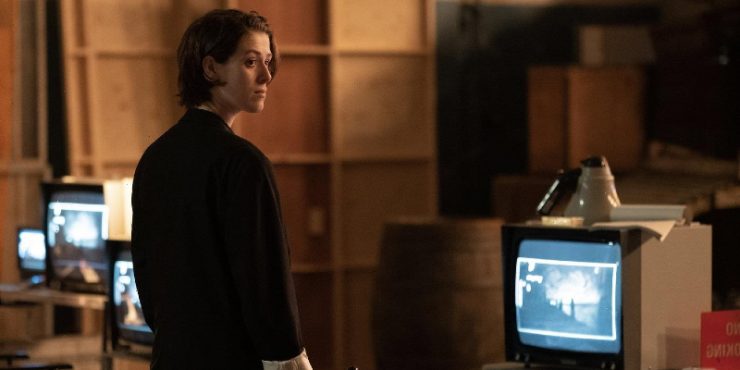Just a simple plot reading of Joanna Hogg’s The Souvenir – a young film student starts a passionate but fraught relationship with a charismatic heroin addict – will not do justice to the complexity of the emotions and themes that it explores. The film was based on Hogg’s own experience in the early 1980’s, a period flanked by ‘The Troubles’ with the IRA. In Part II, Hogg is looking even further inward; not simply at her own autobiography but into the very act of creating autobiography. Reconstructing the past has left Hogg with many questions, for herself as much as for the audience, and this sequel finds fascinating pathways towards answering them. Often those answers make things even more opaque.
Honor Swinton Byrne returns as Julie Harte, the sensitive film student whose cinematic vision is still forming in her mind. After the death of her boyfriend Anthony (Tom Burke) in the first film, Julie is still trying to make sense of the entire affair. She goes around to various people who knew him, asking questions that might bring logic to such an illogical moment. It is the flamboyant Patrick (Richard Ayoade, going from a cameo in the first film to a more substantial role here) who advises her: “memorialize him”. After this, Julie decides that the subject of her graduation film will be her relationship with Anthony, a choice that runs into several emotional and practical pitfalls.
Hogg leans fully into the meta aspect, with Julie trying to construct the very film we saw Hogg make in 2019. She does not shy away from intertextual ironies or thematic overlap. As it unfolds, the director dissects the entire notion of making a film based on one’s memory, a process that can turn equal parts sentimental and disingenuous. As a young woman, Julia seems to meet a number of obstinate men unsure about her filmmaking instincts, whether it be a group of middle aged professors bemoaning the unorthodox format of her script (she has a red bow on it!) or an irate cinematographer incensed by the lack of a formal shot list. Julie is not totally blameless in her troubled production, but the constant second-guessing lends a view of the filmmaking world for women, and Julie in particular.
Hogg’s choppy editing style (with her usual editor Helle le Fevre) intercuts the film school tension with scenes between Julie and her mother, Rosalind (Byrne’s own mother, Tilda Swinton), an old-fashioned, upper class English woman whose affection for her daughter is tinged with concern for her current trajectory. The fact that Julie has the opportunity to ask Rosalind for money when the school declines to support her film (or that she lives in a posh flat by herself) is a detail important in Julie’s character, and this transactional aspect to the mother-daughter relationship puts apprehension in an otherwise harmonious connection. While not a story of class, The Souvenir Part II does not erase it, portraying how Julie has many resources that her classmates may not have access to.
The first Souvenir‘s unique vantage point into creative exploration was one of the film’s secondary charms. The film’s arresting finale image shows Julie on the precipice of elite artistic expression, and Part II delivers on that promise. Hogg is not only focused on the supremacy of the film director, but the vulnerability of creative leadership and the community of filmmaking, warts and all. (Ariane Labed as a fellow student turned lead actress and Jaygaan Ayeh as a bullish and protective producer are particular standouts in the student production scenes.) Meeting much hostility and confusion, Julie’s lack of humility becomes an asset, as she pushes aside needless criticisms and pushes forward on the film that she wants to make. The film becomes a testament to singular expression, to trusting your voice even when it’s not fully formed.
An expert studier of human behavior, the best moments from Hogg’s films are often subtle grace notes within conversations between people trying to express one thing while saying another – or the exact opposite, characters expressing themselves with shocking frankness. With each subsequent film, Hogg has become more adventurous as a visual storyteller and more abstract in her imagery. The Souvenir Part II‘s conclusion is a bold, striking departure from Hogg’s previous work, and it sticks the landing with precision. That it weaves it into the end of a movie composed mostly of vignettes rooted in documentary-like realism is impressive indeed, creating a fierce contrast that only enhances the themes of artistic vision.
The two Souvenir films are attempting to make an honest portrait, and at 61, Hogg is careful to free both films of condemnation or valorization. But Part II is honest about the limits of this construct, the impossibility to make art from grief, to push aside ego in creation. This new film re-contextualizes the first film (and enhances it), by confessing its shortcomings in the realm of truth. Throughout Part II, Julie is having frustrating conversations with actors and crew who seem to intentionally miss the point (the exception being an editor played by Joe Alwyn, who in a few scenes gives Julie a small but generous amount of support), and the film itself makes you question the veracity of points of view. How valid is our vision of a person we love? That Hogg is not sure makes The Souvenir Part II that much more fascinating.
Written and Directed by Joanna Hogg










